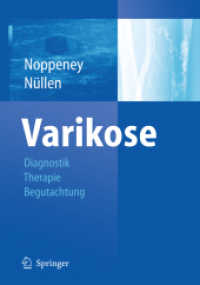- ホーム
- > 洋書
- > 英文書
- > Biography / Autobiography
Full Description
A portal into the perseverance of Jewish culture in the face of attempts to destroy it.
To answer his son's question: what was it like growing up in Samarkand? Rabbi Hillel Zaltzman wrote and researched this memoir and history about Chassidic Jews who found refuge in Samarkand during the World War II and continued to live there under Soviet rule. This is a personal story for Zaltzman, who was born in Kharkov, Ukraine. When the Nazis invaded Kharkov, Zaltzman's parents fled with their three young children to Samarkand (Uzbekistan). There they reconnected to other refugee Chassidic families, as well as some famous Chassidic rebbes also in flight. In Uzbekistan they created a thriving Jewish community until its institutions were abruptly shut down by Stalin immediately after the war. Still this Jewish community in Samarkand, Uzbekistan is remembered as shpitz Chabad—the epitome of Chassidic ideals and devotion.
Zaltzman's father kept him out of the Soviet schools, where atheism was promoted and Sabbath observance was impossible, teaching him furtively at home, until a neighbor discovered his existence at the age of 9. Zaltzman had no choice but to attend a public school then, but he still observed the demands of his faith and stayed home from school when necessary. Hillel studied with esteemed Chabad Chassidic rebbes who taught at great personal risk. If discovered, they could be sentenced to harsh labor in Siberia.
Zaltzman credits his father's unswerving commitment to his chinuch—his Jewish education—was beyond any compromise, and it was an exemplary expression of their Chabad brand of Chassidic Judaism: "The Chabad community was infused with a rich inner world of Chassidic vitality," Zaltzman writes.
Meanwhile, the Soviet regime remained obsessed with eliminating a Jewish religious identity; a special division of the NKVD (Soviet secret police) was assigned the task of destroying Jewish schools and yeshivas, and surveilling individuals through synagogue informers.
Zaltzman records his experiences and adventures and those of other memorable people he has known and the sacrifices they made to share their love of Torah and Jewish learning in the secret underground yeshivas. He describes their attempts to celebrate Jewish holidays, make matzah, and obtain prayer books, as well as their other colorful escapades. He also tells of their exasperating experiences trying to obtain exit visas to leave the Soviet Union. The largely untold story of Chabad activism and heroism comes through with great immediacy in this first-person account of spiritual resistance to a Communist regime at war with the Jewish devotion to God and Torah.
From the age 16, along with several other idealistic young men, Hillel Zaltzman was involved in Chamah, an underground Jewish organization that helped sustain and preserve Jewish life in the Soviet Union through education. Chamah established a network of underground Jewish schools that clandestinely taught more than 1,500 children over the years and provided material and spiritual support to Jews trying to obtain exit visas in the 1960s and 70s. Hillel himself was allowed to immigrate to Israel only in 1971, after years of trying. Now living in New York, he is the director of IChamah, an international organization which is devoted to serving Jews from the Former Soviet Union in Israel, Russia, and the US. Rabbi Zaltzman was honored for his humanitarian and Jewish outreach in the U.S. Senate in May 2016, as part of Jewish American Heritage Month.
Contents
Partial Table of Contents (Balance will be filled by February 1st):1. A Chassidic Education in Communist Russia
2. My Father's Youth in Lubavitch
3. The War Years in Samarkand
4. The Uncles I Didn't Know
5. The Postwar Years under Stalin
6. Our Distinguished Guest: R. Berke Chein
7. Secret Worship Services
8. The Legendary Chassid: R. Simcha Gorodetzky
9. Our Bukharian Champion: R. Refael Chudaidatov
10. Making Matzah
11. The Founding of Chamah
12. The Underground Yeshiva
13. What Was the KGB Looking for in My Workshop?
14. Shabbos Bereishis in the Cotton Field
15. Mentor and Friend: R Mendel Futerfas
16. Adventures on the Road
17. Matchmaking in the Shadow of the KGB
18. My Mother's Death and My father'sImmigration to Israel
19. Leaving Russia
20. From Dream's in Russia to Reality in Israel
Glossary
About the Author







